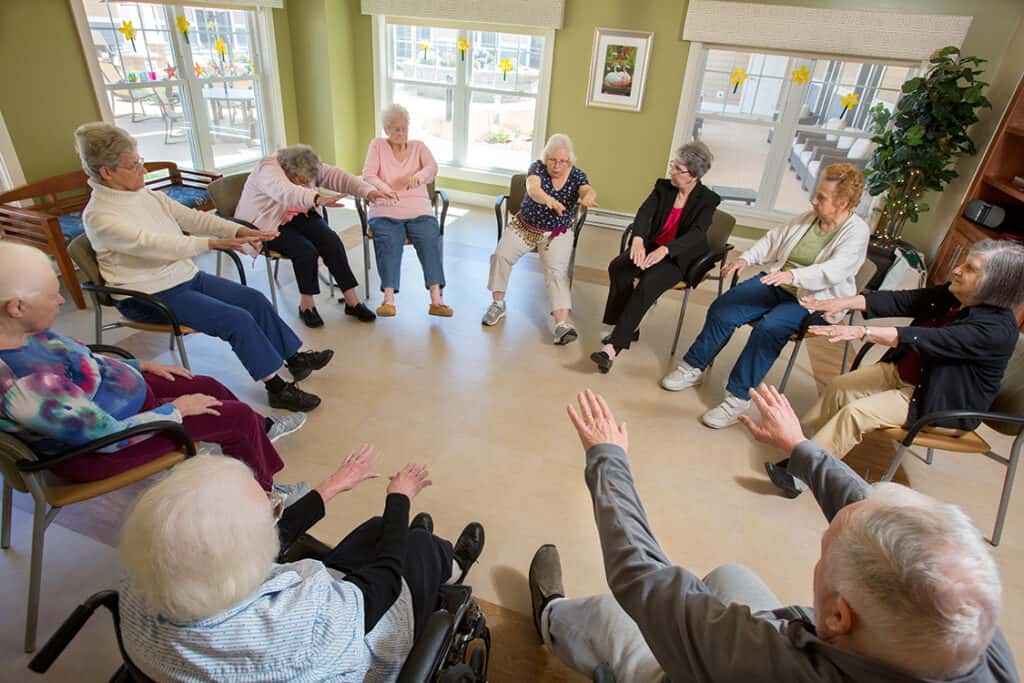Get expert attention with professional Memory Care solutions.
Understanding Just How Helped Living Sustains Patients With Dementia Treatment Needs
Aided living facilities are significantly recognized for their essential function in resolving the complex care requirements of patients with mental deterioration. Assisted Living. By offering an organized yet supporting atmosphere, these facilities not just promote security and health however also foster a sense of autonomy through individualized treatment plans. In addition, involving activities and socializing possibilities are integral to improving cognitive feature and emotional wellness. The nuances of just how these elements interact to develop an encouraging area warrant closer assessment, especially in comprehending their long-term impact on homeowners' high quality of life.
Review of Mental Deterioration Care
Mental deterioration treatment is increasingly vital as the prevalence of dementia-related conditions rises amongst maturing populations. The condition can differ considerably in its discussion, calling for customized treatment techniques to fulfill individual requirements.
Efficient mental deterioration treatment includes a multidisciplinary method, incorporating medical, psychological, and social support. Medical care experts, caretakers, and household participants need to team up to produce a nurturing environment that promotes the health of individuals with dementia. Key components of dementia care include customized care plans, cognitive excitement treatments, and behavior treatments targeted at enhancing high quality of life.
Additionally, it is necessary to identify the emotional and emotional challenges faced by both patients and caretakers. Education and learning and training for caregivers play a critical role in cultivating understanding and compassion, therefore improving interactions with those impacted by dementia. As the demand for dementia treatment proceeds to rise, the emphasis must remain on delivering thoughtful, person-centered care that respects the dignity and preferences of people dealing with this problem.
(Charlotte Alzheimer's Care)
Function of Assisted Living Facilities
Helped living facilities play an important role in giving care for individuals with dementia, offering a supportive atmosphere that balances self-reliance with the required help. These centers are made to accommodate the special requirements of citizens, advertising a feeling of neighborhood while making sure security and health.
In an assisted living setup, experienced employee offer perpetual assistance, helping with daily tasks such as bathing, dressing, and drug administration. This level of treatment is critical for people with dementia, who might fight with these jobs as a result of cognitive decline. Additionally, centers usually incorporate memory-enhancing programs and social activities customized to promote cognitive functioning and urge social communication.
The physical setting of assisted living centers is additionally optimized for security, including secure entrances, well-lit paths, and clear signage to aid citizens browse their surroundings. These neighborhoods promote a feeling of belonging, decreasing the sensations of seclusion that people with dementia might experience.
Personalized Care Plans
To make certain that each resident obtains one of the most appropriate care, individualized treatment plans are important in assisted living centers for individuals with dementia. These plans are customized to meet the special demands, choices, and obstacles dealt with by each homeowner, promoting their dignity and top quality of life.
The growth of a personalized treatment strategy typically begins with a comprehensive evaluation performed by healthcare professionals. Assisted Living. This evaluation evaluates the individual's cognitive abilities, physical health and wellness, emotional health, and social choices. Input from member of the family and the resident themselves is essential, as it offers useful understandings right into their history, routines, and individual passions
As soon as the assessment is complete, a multidisciplinary group works together to create a treatment strategy that describes details objectives and treatments. This might consist of medication monitoring, daily living aid, and behavior approaches customized to mitigate stress and anxiety or anxiety.
Regular reviews and updates to the care plan ensure it remains relevant as the person's problem advances. Memory Care. By focusing on individualized care, assisted living centers can improve the general well-being of residents with mental deterioration, promoting an atmosphere that appreciates their individuality while resolving their treatment needs properly
Involving Activities and Socializing
Engaging activities and socialization play a vital duty in improving the lifestyle for homeowners with mental deterioration in assisted living facilities. These tasks are created to promote cognitive feature, promote psychological wellness, and foster links among citizens. Structured programs, such as art treatment, music sessions, and memory treatment, give possibilities for individuals to share themselves artistically while additionally causing positive memories.
Socializing is equally vital, as it battles feelings of seclusion and loneliness that can come with dementia. Group tasks, including video games, group trips, and common dining, motivate communication and help locals construct helpful partnerships with peers and caregivers. This sense of area not only enhances their daily experiences however also adds to a more secure psychological environment.
Furthermore, involving activities can be tailored to private choices and cognitive levels, guaranteeing that each resident can take part meaningfully. By developing an environment that focuses on interaction and social communication, assisted living centers can significantly boost residents' general psychological wellness, fostering a feeling of purpose and belonging. Ultimately, these efforts are crucial elements of comprehensive dementia care, considerably affecting residents' general health and joy.
Advantages of Area Support

Additionally, community assistance advertises social interaction, which is essential for cognitive and emotional wellness. Engaging with peers and joining team activities can improve state of mind and motivate reminiscence, adding to a greater feeling of belonging. This social interaction is vital, as loneliness and seclusion can exacerbate cognitive decline.

(Memory Care Charlotte)
Conclusion
To conclude, aided living facilities act as crucial settings for individuals with dementia, supplying organized assistance that fosters both self-reliance and safety and security. The implementation of individualized care plans makes sure that each local's one-of-a-kind needs are satisfied, while involving tasks promote social interaction and cognitive interaction. The sense of area within these centers significantly reduces feelings of isolation, boosting overall emotional well-being. Therefore, assisted living plays a crucial function in boosting the lifestyle for patients with dementia.